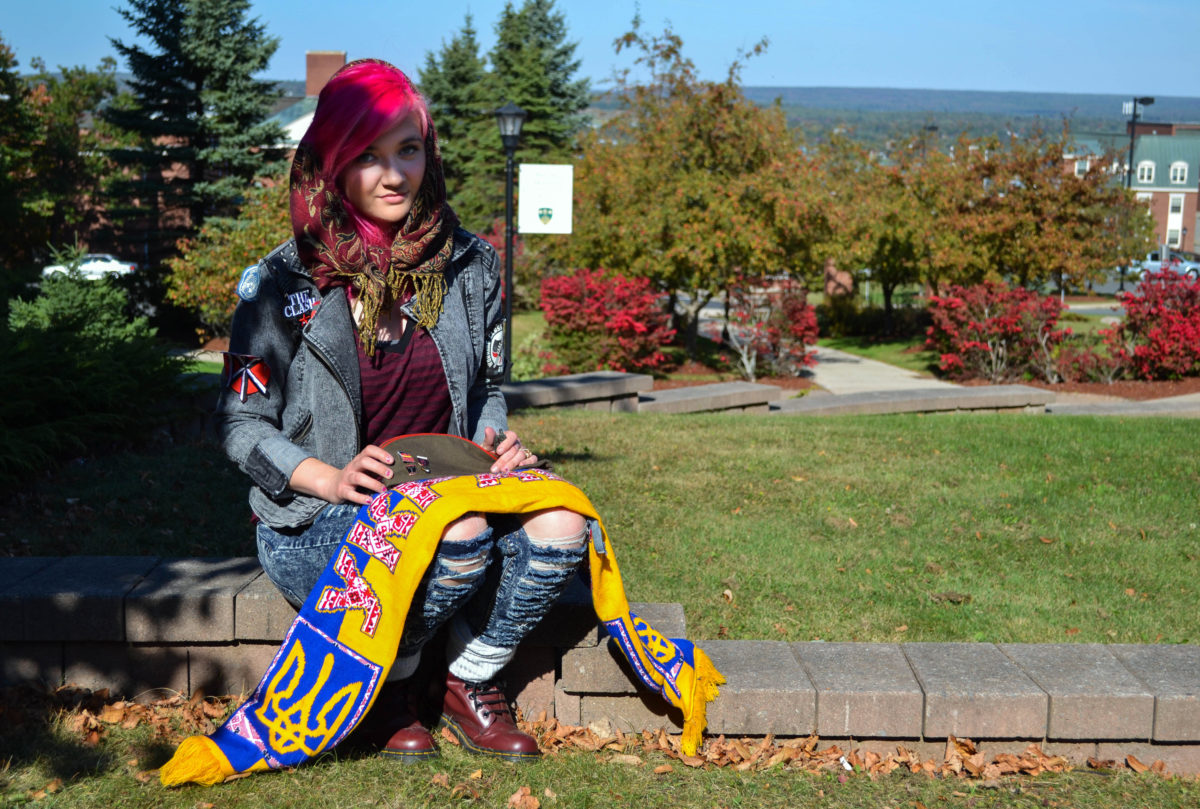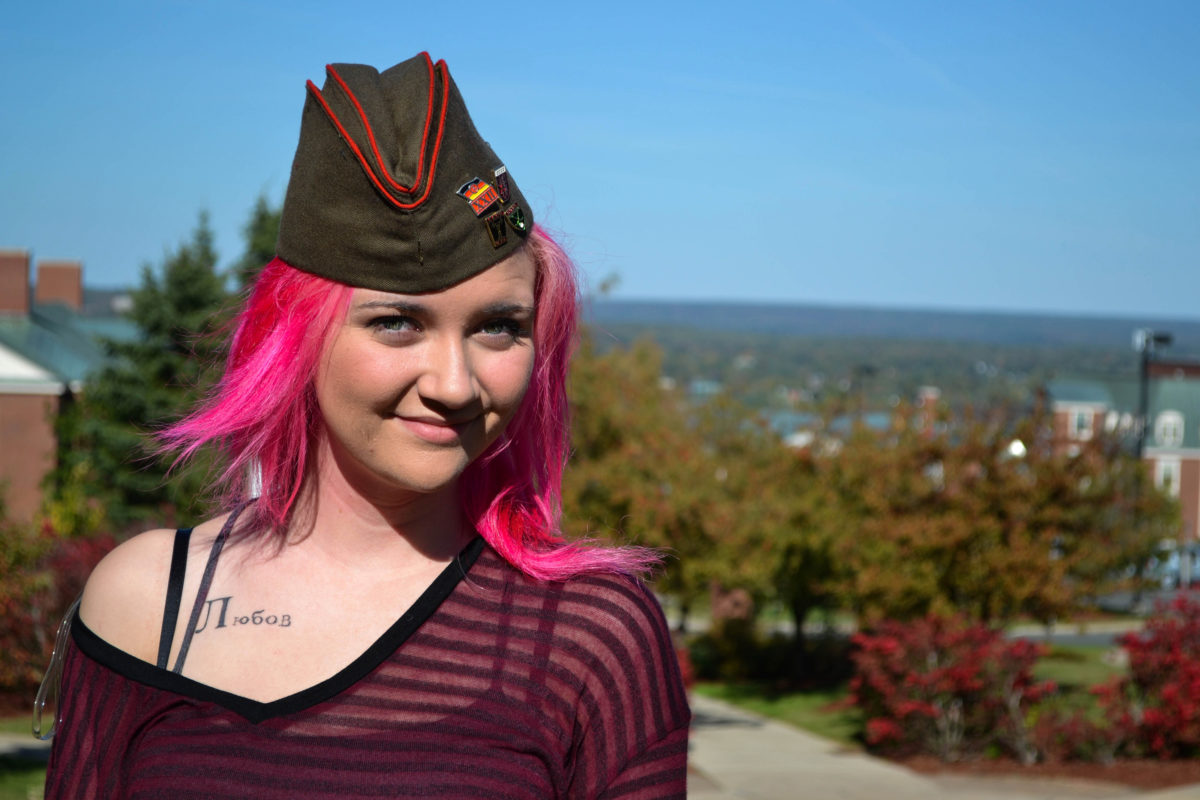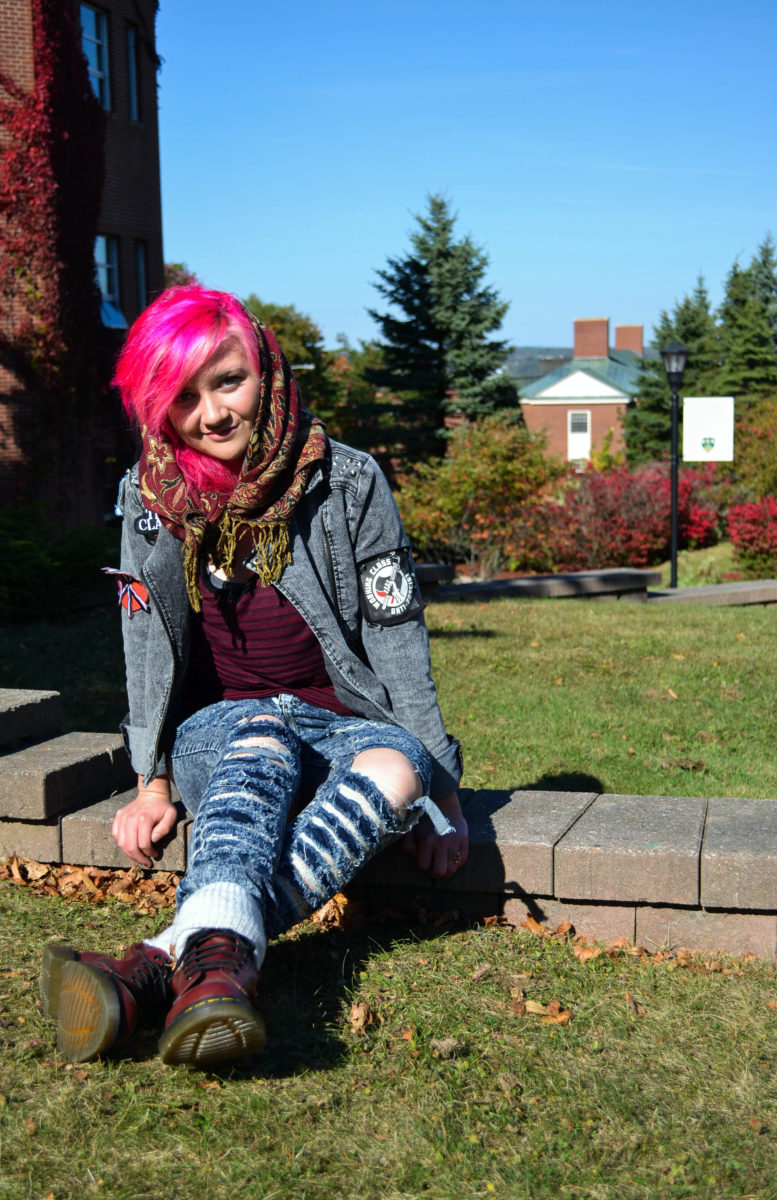Michaila McGee’s hair is bright pink like electric neon. She is wearing a jean jacket covered in punk bands. The Clash, the Dead Kennedy’s – you name it. One of the patches has become unstitched on one side and hangs down; I can’t quite see it what it is. When I ask about her patches, it’s one of the first ones she shows off. It’s the United Nations.

Under her jacket, I can see tattooed script on her collarbone. She tells me it means “love” in Ukrainian. It’s for her Uncle Lushiniky.
“[My uncle] said to me, ‘Michaila, listen to me, you can do anything your heart desires,’” said the first-year St. Thomas student studying politics, German, and human rights. “‘You follow human rights. Just see where that brings you.’”
Her uncle had promised to help her with prom last year, but was killed during riots in her native Ukraine before he could.
“I’m kind of avenging him in a way.”
•••
McGee was born in Ukraine but came to Canada when she was six. Her mother grew up in Ukraine; her father was a Sea King helicopter mechanic for the navy and was stationed back in New Brunswick. Still, she’s visited her homeland and kept in close touch with friends. Her first kiss, Dmitri, and her cousin, Yanuch, remained close to her heart. And Yanuch’s father, her Uncle Lushiniky. They could still Skype.
But since the revolution last winter that ousted Russian-backed president Yanukovych for a pro-European government, the joy of a freer Ukraine has been tempered by loss. And with Russian president Vladimir Putin sending troops to the Crimean peninsula and continuing to arm Russian-speaking rebels in the East, McGee continues to be anxious about her family.
“I’m dying my hair because I’m getting grey hairs from this shit.”
•••


Her Uncle Lushiniky was a university professor who also worked at Chernobyl. His grey eyes, and dark unruly hair made him look like a mad scientist or Sam the Eagle with his big nose, she says.
“What’s wrong with you,” he once said to her. “You live in a place with no radiation. Your face is beginning to sag.”
She describes him as a jokester with a warm smile. He got McGee into punk music.
When then Ukrainian president Yanukovych turned his back on an association agreement with the Europe Union in favour of closer ties to Russia last November, Lushniky was all for Europe. He and his family hit to the streets to protest, protests that often turned to riots after the state police were called in.
It was Jan. 6 when McGee got the phone call. A riot police officer had beaten Lushniky during a protest. He was in critical condition.
“He could have just stayed out of there, but he didn’t,” McGee said. “He grew up in Soviet Ukraine. He didn’t really want to see us go back to Russia. That’s why he was rioting.”
The next day, McGee got out of the shower, checked her phone and found out Lushniky had died of internal bleeding and brain haemorrhaging.
“It was horrible time, I slipped into a really bad state of depression for about a month.”
•••
In February, peace talks began and the riots calmed down, but a week or two later the fighting broke out again. This is when her friend Dmitri and cousin Yanuch decided to join a pro-Ukrainian independence resistance.
McGee and her cousin Yanuch were close but they had parted ways for a few years in their childhood. It wasn’t over nothing.
“He was an idiot. We were close but for a few years we weren’t because he got involved with a fascist skinhead movement, which really pissed me off,” McGee said.
“Everybody thought he was dumb for becoming a fascist. We grew up in a Jewish district where all our friends were Jewish, and our babysitters were and all that stuff. I don’t understand him with that.”
One day he was beaten up by a group of his Jewish childhood friends because of his anti-Semitic views. Still, McGee couldn’t just push Yanuch out of her life.
“I kind of had to forgive him because I was like, ‘You’re an idiot. You don’t understand these things. You’d rather look at naked ladies in magazines.’ He is a typical teenage idiot guy.”
Despite his fascist past, Yanuch believed in a free Ukraine and was willing to fight for it. He was his father’s son.
Dmitri and Yanuch went to Crimea to heckle pro-Russian activists but left when they sensed danger. They travelled around Ukraine for a while, bouncing around from Odessa, to Kiev and finally to Luhansk. It was at this time Russia had started moving in from the East to control Donetsk, Kharki and Luhansh.
“March 23, I got a phone call saying my cousin was bludgeoned in a fist fight between him and three pro-Russians,” McGee told me.
Yanuch was rushed to medical aid, but his skull was cracked open and he’d lost too much blood. There was nothing they could do.
Dmitri and he had become separated in the crowd. One thing McGee is grateful for is that Dmitri had been pushed to the back, unharmed.
•••
Dmitri and McGee jumped trains across Ukraine when she was went back to visit when she was 13. Her parents didn’t know he was her first kiss.
It was Dmitri who had told her the news about Yanuch. McGee was losing contact with her family in the Ukraine. Nobody would answer any of her questions. But after Yanuch’s death, even Dmitri started to slip away. He fell into depression; McGee would have to stay up for nights on end trying to convince him not to kill himself.
“He didn’t want to go through it anymore. He was tired of it. But he couldn’t get out of the resistance,” McGee said. “He’d be backing out of what he believed in and he’d be shunned.”
She lost contact with him for about a month this summer. She was a wreck. They did finally reconnect.
“We were just starting to get back in touch, and then last Saturday (the 13th), I found out something was up. They couldn’t find him. He was missing. Later on in the week I found out he was dead.”
McGee doesn’t know how her best friend died.
“He was just face down in a ditch. They’re still trying to figure out if it’s because of his head being cracked, or if it’s because of his broken neck or if one of his broken ribs punctured his heart. We don’t know.”
•••
Throughout this interview, McGee has had to stop herself constantly. Not to stop herself from crying, she’s been remarkably strong on that front. She stops to correct her grammar. It’s a simple switch: present tense, to past tense. She’s constantly correcting the way she talks about the people who have affected her life the most. They no longer are, they were. It’s heartbreaking to watch.
McGee carries them with her wherever see goes. She sells artwork for the organization I’m a Drop in the Ocean to support displaced families in Ukraine. Some of her artwork is on display in Berlin.
She’s going to join the Canadian Armed Forces and after her studies hopes to go out to Germany to be close to the action. She wants to be a Human Rights Officer.
“I really want to do it out of honour of my uncle, my cousin and my friend. I just don’t want people to die out of something so stupid ever again.”

